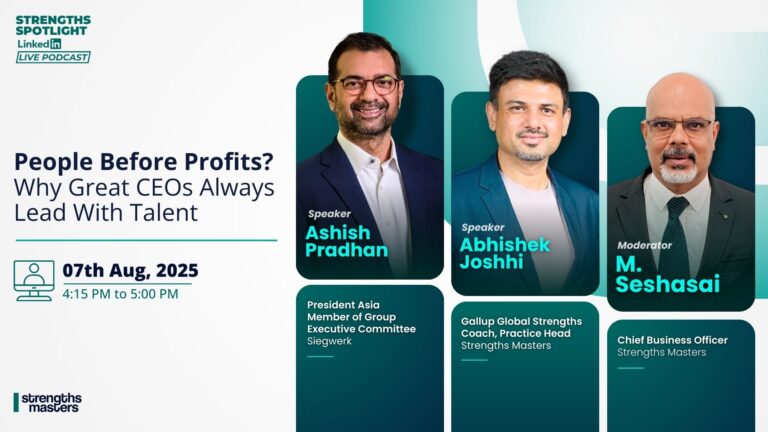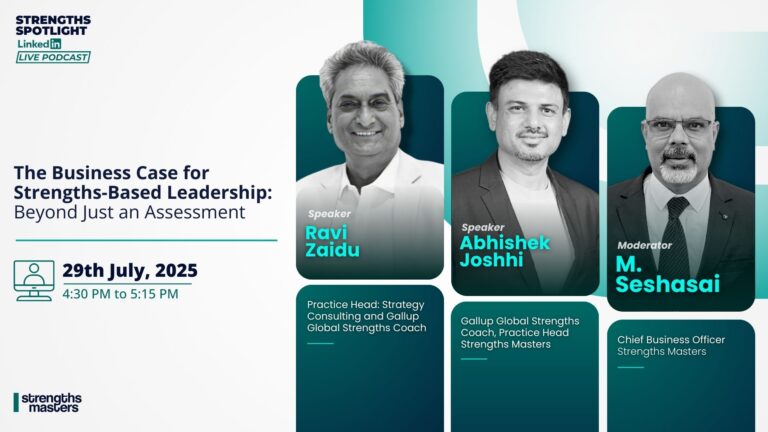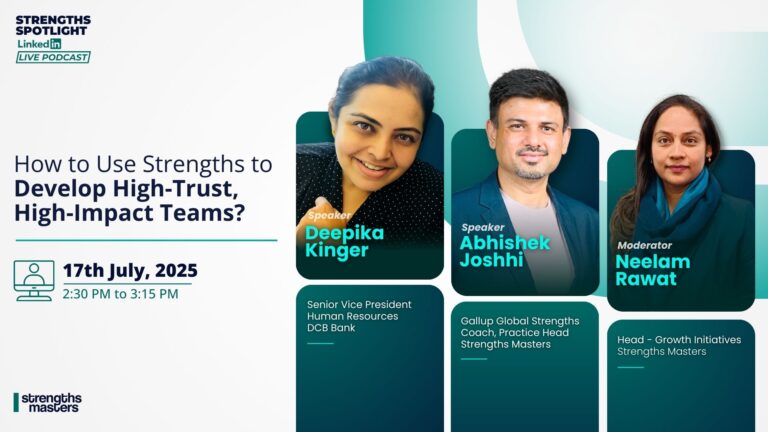A Strengths Spotlight Conversation with Surbhi Dewan.
The Unspoken Pause in the Career Ladder
Every ambitious professional hits a moment of reflection. You’ve built your credibility, delivered results, and moved through the ranks, but then it hits you: What’s next? This is the silent pause many face after middle management. It’s not a question of capability but of clarity.
In this month’s Strengths Spotlight LinkedIn Live, powered by Strengths Masters, we explored the nuanced, layered journey beyond middle management. The session tackled career inflexion points, identity shifts, and the invisible ceilings that even the most competent leaders encounter. The theme? What’s next after middle management: career pathways and plateaus.
Introducing Our Guest: Surbhi Dewan
Joining us was Surbhi Dewan, a powerhouse in the HR landscape. With over 20 years of experience, Surbhi is a certified PI and Topgrading practitioner, an alumna of NYU, and currently leads HR at Ashiana Housing. Her insights have earned her accolades such as the Business World 40 Under 40 and the People First HR Excellence Award.
What sets Surbhi apart isn’t just her credentials; it’s her ability to turn complex leadership ideas into practical, people-first actions. Her passion lies in helping professionals navigate pivotal transitions, not just upwards, but forward, deeper, and more meaningfully.
Unpacking the Discussion: The Realities After Middle Management
When asked what comes to mind when she hears the phrase “What’s next after middle management?”, Surbhi offered a thought-provoking response:
“It’s not about a promotion, it’s about taking stock. It’s time to treat your career like a portfolio. This stage demands reflection, reinvention, and the courage to explore, not just climb.”
She emphasised that middle management is an inflexion point, a subtle shift where professionals either stay experts or move into broader roles. The risk? Feeling boxed in or invisible. “Most don’t admit it,” she noted, “but many feel stuck, doing the heavy lifting but going unrecognised.”
Abhishek Joshhi, founder of Strengths Masters, echoed the need to break out of linear thinking. “Often, leaders at this stage aren’t clear on their growth roadmap because no one’s sat them down to have that conversation. The internal compass is strong, but the external support is missing.”
The discussion also spotlighted the dangers of stagnation, the undervaluing of lateral moves, and the mental myths around leadership, especially the idea that only extroverted, animated personalities can lead. Surbhi debunked this gently but firmly: “Leadership is not about noise, it’s about conviction, clarity, and connection.”
Five Key Lessons from Surbhi Dewan
- From Doing Things Right to Doing the Right Things
Middle managers often excel at execution, but senior leadership requires a mindset shift. “It’s no longer about being the go-to person for delivery,” said Surbhi. “It’s about being a visionary, an enabler, someone who brings people along.” This transition is not just skill-based; it’s psychological. - Comfort Zones Are the Real Ceiling
One of the biggest barriers to growth isn’t external, it’s internal. Surbhi noted that many managers plateau because they stop learning. “They’re experts at sprinting but unprepared for the marathon,” she said. Cross-functional exposure, ambiguity handling, and curiosity are non-negotiable for the next leap. - Strengths Can Reveal Hidden Doors
Abhishek shared a powerful example of a leader who was perceived as too introverted for sales. But through strengths-based coaching, his deep relationship-building skills (Relator strength) revealed he could thrive in client-facing roles. “We don’t just stereotype others, we stereotype ourselves,” he explained. Strengths science breaks that loop. - Organisations Must Enable Before They Expect
Surbhi emphasised that leaders aren’t born at the top, they’re built across time. At Ashiana, future leaders are given customer-facing roles, mentoring, strategic projects, and real-time learning before they are promoted. “We believe in giving people not just titles, but the tools to grow into them.” - Clarity Comes from Introspection, Not Instruction
Career growth at this stage isn’t about being told what to do; it’s about asking better questions. What energises me? What kind of leader do I want to be? What am I avoiding out of fear or comfort? “There’s power in pausing to listen to yourself,” said Surbhi. “Not every move has to be fast. But it should be yours.”
Final Thoughts: Stretching Beyond the Plateau.
This conversation was a mirror for many professionals sitting in that quiet middle layer, skilled, experienced, and capable, but unsure of what the next version of success should look like.
The answer isn’t always upward. Sometimes it’s wider, into influence. Sometimes it’s deeper, into purpose. And sometimes, it’s sideways, into learning and experimentation. What matters is making the move consciously, not reactively.
Surbhi’s words leave a lasting impact:
“Let’s not just build great leaders. Let’s build courageous ones, willing to reflect, unlearn, and stretch. The right leap isn’t always immediate. But with the right support, it is inevitable.”
For organisations, this is a wake-up call to stop seeing middle management as a waiting room and start treating it as the proving ground for your most impactful leaders.
For professionals, it’s a reminder: If you feel boxed in, maybe it’s time to stop waiting for permission and start rewriting your playbook.
Quotable Moments
- “Leadership isn’t about volume. It’s about vision, influence, and trust.”
- “You don’t outgrow roles. You outgrow patterns.”
- “Don’t wait to be seen, create visibility through value.”
Next Steps
To revisit the full conversation or explore more Strengths Spotlight episodes, follow Strengths Masters on LinkedIn and Youtube. If you’re an HR leader, team manager, or mid-career professional ready to reimagine growth, reach out. Your next chapter may already be waiting.
Until then, stay curious, stay intentional, and always stay in your strength zone.
[Note: The views expressed by the speaker are their own and do not represent those of their organization.]





